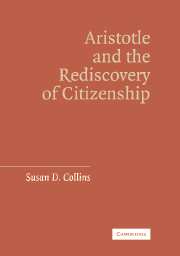Book contents
- Frontmatter
- Contents
- Acknowledgments
- Aristotle and the Rediscovery of Citizenship
- Introduction: The Rediscovery of Citizenship
- 1 Liberal Citizenship and Aristotle's Ethics
- 2 Citizen Virtue and the Longing for the Noble
- 3 Justice as a Virtue
- 4 Prudence, the Good Citizen, and the Good Life
- 5 Citizenship and the Limits of Law
- 6 Political Wit and Enlightenment
- Conclusion: Aristotle and the Rediscovery of Citizenship
- Bibliography
- Index
4 - Prudence, the Good Citizen, and the Good Life
Published online by Cambridge University Press: 17 July 2009
- Frontmatter
- Contents
- Acknowledgments
- Aristotle and the Rediscovery of Citizenship
- Introduction: The Rediscovery of Citizenship
- 1 Liberal Citizenship and Aristotle's Ethics
- 2 Citizen Virtue and the Longing for the Noble
- 3 Justice as a Virtue
- 4 Prudence, the Good Citizen, and the Good Life
- 5 Citizenship and the Limits of Law
- 6 Political Wit and Enlightenment
- Conclusion: Aristotle and the Rediscovery of Citizenship
- Bibliography
- Index
Summary
THE PROBLEM OF PRUDENCE
When Aristotle concludes the account of the particular moral virtues to turn to intellectual virtue, the question of the standard to which the morally virtuous person and the law look in determining right action forms a new horizon in the Nicomachean Ethics (NE 1138b13–14). That this question remains is indicated immediately by the fact that he returns to the subject of right reason he had earlier postponed (NE 1138b18–20). The investigation of right reason is inseparable from a consideration of the target (scopos) at which the virtues aim and the boundary (or limit, horos) within which the mean is identified (NE 1138b21–5, 32–4). In the absence of such a consideration, the definition of virtue – as the mean defined by the prudent human being (phronimos) – is true but unclear (NE 1138b25–6).
Despite the apparent urgency of this task, Aristotle does not approach it directly, instead undertaking a lengthy treatment of the characteristics of the rational or intellectual parts of the soul. While we might then expect his discussion of prudence, the rational characteristic that governs deliberation in the realm of action, to shed light on the question of right reason, this discussion proves first to complicate rather than illuminate the matter. A simple sketch brings out the central difficulty. In short, we learn that prudence is required for perceiving the right thing to do in a particular situation.
- Type
- Chapter
- Information
- Aristotle and the Rediscovery of Citizenship , pp. 91 - 118Publisher: Cambridge University PressPrint publication year: 2006



